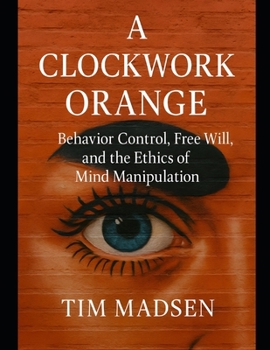A Clockwork Orange: Behavior Control, Free Will, and the Ethics of Mind Manipulation
What does it mean to be free in a world obsessed with control?
Stanley Kubrick's A Clockwork Orange has captivated and unsettled audiences for over five decades. Its shocking images, stylized violence, and philosophical provocations remain as urgent today as they were in 1971. But beneath the surface lies a deeper set of questions-about the nature of morality, the mechanics of the mind, and the ethical limits of state power.
In A Clockwork Orange: Behavior Control, Free Will, and the Ethics of Mind Manipulation, this landmark film is examined through the lens of philosophy, neuroscience, psychology, and political ethics. Across ten sharply focused chapters, the book explores the disturbing transformation of Alex DeLarge from sociopathic criminal to mechanized puppet-offering a profound meditation on whether engineered "goodness" is truly good at all.
From the science of conditioning to the perils of media spectacle, from Kantian ethics to contemporary neurotechnology, this interdisciplinary analysis reveals how A Clockwork Orange foreshadowed today's debates over surveillance, behavioral engineering, and the erosion of free will in modern society.
Both a tribute to Kubrick's cinematic genius and a warning for the future, this book is essential reading for scholars, students, and anyone concerned with the increasingly blurred line between freedom and control.





